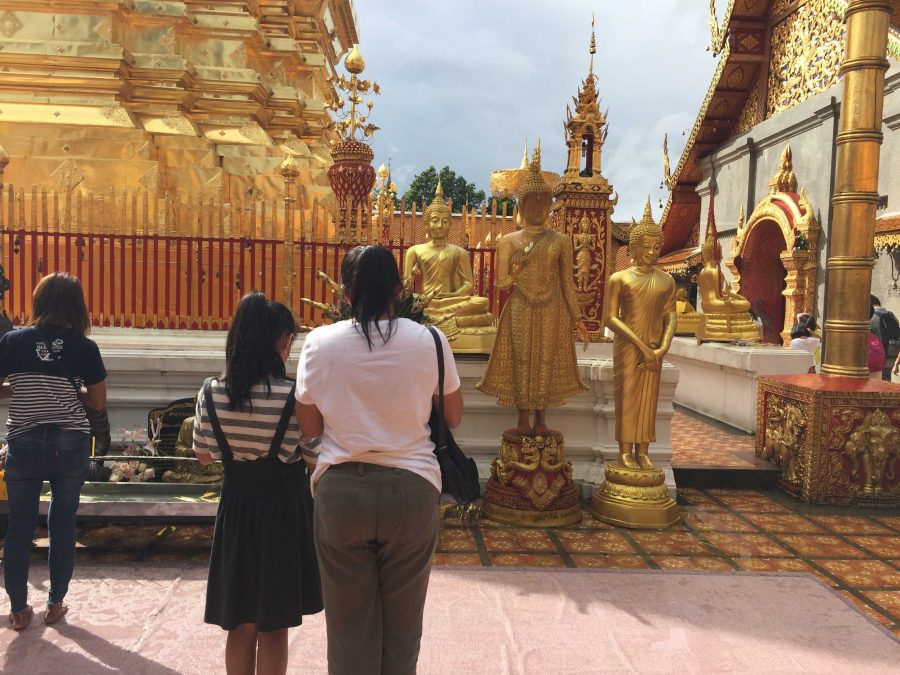By: Nick Smaldone
Driving around Chiang Mai, it is not uncommon to see homes with dirt floors, exposed bamboo walls, thatched roofing, faded cement, and loose wiring. It is also not uncommon to see ornate golden temples with towering statues, intricate colorful paintings, and perfectly manicured gardens.
Whether walking down a busy city street of old cramped apartment buildings or driving past small isolated farmers on the mountainside, turn down any road and a grand and opulent show of the country’s devotion to Buddhism will be waiting.
It can be hard for a westerner to grasp the widespread and unifying role of Buddhism in Thailand. Ninety-six percent of the country are Buddhists, from the king himself, to rural, stateless villagers.
I spoke with monk Pra Jo Lee to learn more about how Buddhism’s omnipresent place in Thailand, and its effect on an entire country’s mindset.
I met him at Wat Suan Dok, home of the giant gold Chedi, the ancient Chiang Mai cemetery, the Buddhist Mahachulalongkornrajavidyalaya University. Here Buddhist students follow a strict schedule of class, meditation, and cleaning on their way to monkhood.
It is custom for men in Thailand to spend some time in the monkhood, from as little a couple days to a lifetime. Men join in obligation to their family, country, and faith. It also very common for poor villagers to join after elementary school to receive a better education.
Contrasting to what others may think, he makes it first clear that “Buddhism is a philosophy. There are Christian and Muslim Buddhist monks.” Central to this Buddhist philosophy, he continues, are “mindfulness, listening, and meditation.”
When trying to explain their importance, Pra Jo Lee explains that, “you can meditate anywhere. You can meditate walking” and focus on your feet’s repetitive motions as they touch the ground.
“The Buddha has big ears because he is always listening, but he does not believe everything he hears,” he says only semi-jokingly regarding common images of the Buddha.
Beyond these three main ideas, there is much variation in Buddhism across the world. Thai buddhists do not adhere to the Dalai Lama of Tibet nor do they build the tall pagodas seen in Japan. In Thailand elements of folk religions are included into Buddhism, such as ceremonies and offerings to dead ancestors and the land.
After my talk Pra Jo Lee, it became evident that in Thailand the original Indian ideas of a post-life Nirvana or Enlightenment are not as present.
More importantly Buddhists in Thailand focus on the here-and-now of the present. They know an essential truth of life is suffering, a main pillar of Buddhism, and they now that it is impossible to eliminate suffering, only lessen it.
Pra Jo Lee quirks that “monks shave their heads to keep us away from from distracting ourselves. If we had hair we would always worry if our hairstyle was in style and people liked it, and we would not able to be mindful and focus.” Yet there is a more important sense of the danger of trying to find happiness from things.
To an American, where shows like Hoarders can top networks and ‘the rat race’ has been coined to define the unspoken competition for money, this negative idea of physical possession can be hard to understand.
He uses story to explain the dangers of material goods: “the queen of the Philippines had 1,000 pairs of shoes, while her neighbor had just one. When a flood came and destroyed the land, who suffered more? The queen had lost all of her shoes, while the neighbor only had to get one new pair of shoes. Distance material things and live simply to live more fully.”
Most Americans would probably described the people living in the aforementioned huts with dirt floors and bamboo walls as destitute and in poverty. However, the inhabits would strongly disagree with those statements.
They do not see themselves as poor as they do not measure their lives by material wealth. They live healthfully, and more importantly, happily. The people of Thailand do not need the possessions westerners focus on because through this strong adherence to Buddhism they have found happiness within themselves.
Now it would be ignorant to not point out the ironic opulent gold temples that dot the country, many of which were created using donations from common people. Yet, it’s the mindset of where the money comes from; people give whatever money they have to something they have faith in and truly believe in, not themselves.
While Thailand still faces many problems, it’s people and religion still have a lot to teach the world. The country has earned the unique moniker of ‘the land of smiles.’ Even more than the grand temples or various living conditions, a visitor has to notice the unanimous good feelings the entire country. They might not have much, but they don’t need much to be happy.







